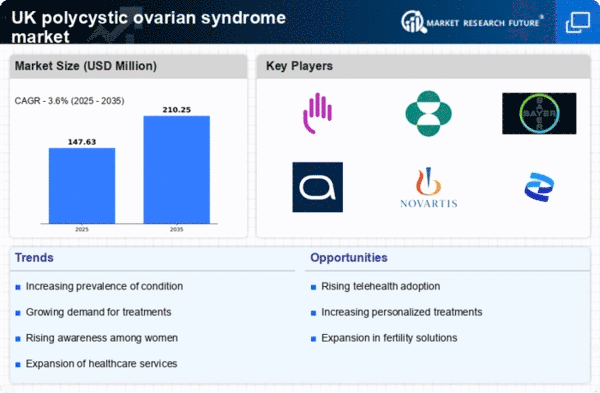Growing Focus on Women's Health
The increasing focus on women's health issues in the UK is a notable driver for the polycystic ovarian-syndrome market. As societal awareness of women's health challenges rises, there is a corresponding demand for targeted healthcare solutions. This shift is prompting healthcare providers to prioritize conditions like PCOS, leading to enhanced treatment options and support services. The emphasis on holistic approaches to women's health, including lifestyle modifications and mental health support, is likely to influence the market positively. Furthermore, the growing number of support groups and advocacy organizations dedicated to PCOS is fostering a community that encourages women to seek help, thereby potentially increasing market engagement and growth.
Government Initiatives and Support
Government initiatives aimed at improving women's health in the UK play a significant role in driving the polycystic ovarian-syndrome market. The UK government has implemented various health policies and funding programs to enhance awareness and treatment accessibility for conditions like PCOS. These initiatives include public health campaigns and funding for research into effective treatments. As a result, healthcare providers are increasingly encouraged to offer screening and management services for PCOS, which may lead to a higher diagnosis rate. The financial support for research and development in this area is expected to foster innovation, potentially leading to new therapies and improved patient outcomes, thereby expanding the market.
Rising Demand for Fertility Treatments
The rising demand for fertility treatments among women with polycystic ovarian syndrome is significantly impacting the polycystic ovarian-syndrome market. PCOS is a leading cause of infertility, and as more women seek assistance in conceiving, the market for fertility-related therapies is expanding. In the UK, the number of women seeking fertility treatments has increased by approximately 15% over the past few years, highlighting the urgent need for effective solutions. This trend is prompting healthcare providers to develop specialized treatment plans that address the unique challenges faced by women with PCOS. Consequently, the market for fertility treatments is expected to grow substantially, with projections indicating a potential market value of £500 million by 2027.
Advancements in Diagnostic Technologies
Advancements in diagnostic technologies are transforming the landscape of the polycystic ovarian-syndrome market. Enhanced imaging techniques and biomarker identification have improved the accuracy of PCOS diagnoses, allowing for earlier intervention and better management of the condition. The integration of artificial intelligence in diagnostic tools is also emerging, which could streamline the identification process and reduce the time to diagnosis. As these technologies become more widely adopted in clinical settings, the demand for related diagnostic products and services is likely to increase. This trend may contribute to a projected market growth of approximately 8% annually over the next five years, reflecting the importance of accurate diagnosis in effective treatment.
Increasing Incidence of Polycystic Ovarian Syndrome
The rising incidence of polycystic ovarian syndrome (PCOS) in the UK is a critical driver for the polycystic ovarian-syndrome market. Recent studies indicate that approximately 1 in 10 women of reproductive age are affected by this condition, leading to a growing demand for effective treatment options. This increase in prevalence is likely to spur healthcare providers to enhance their focus on diagnosis and management strategies. Consequently, pharmaceutical companies are investing in research and development to create innovative therapies tailored to the unique needs of women with PCOS. The market is projected to expand as awareness of the condition grows, with an estimated market value reaching £1.5 billion by 2026, reflecting the urgent need for comprehensive care solutions.

















Leave a Comment